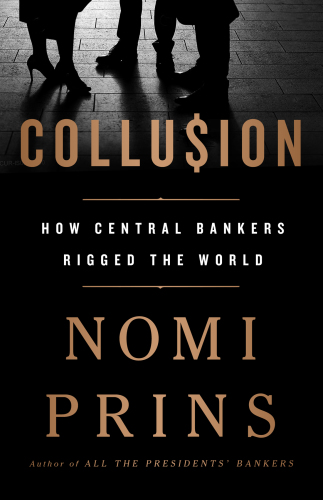
Collusion
How Central Bankers Rigged the World
کتاب های مرتبط
- اطلاعات
- نقد و بررسی
- دیدگاه کاربران
نقد و بررسی

February 19, 2018
This unflinching, troubling exposé from Prins (All the Presidents’ Bankers), a journalist and former banker at Lehman Brothers, forecasts impending doom for the global economy—all at the hands of central bankers. Prins criticizes the efforts made since 2008 to guard against future banking crises, charging regulators with increasing the supply of “artificial money” rather than fostering sustainable growth. She ascribes the 2008 crisis to a too loosely regulated banking system; ever since, G7 central banks have “colluded” to keep private banks afloat through quantitative easing, which entails buying bonds and other assets from financial institutions to increase the money supply. According to Prins, this has resulted in asset bubbles, which, when popped, could bring down banks and markets. The book’s most chilling section consists of Prins’s predictions of what awaits a world economy threatened by rising income inequality and an elite class bent on preserving its dominance: a bigger collapse than the 2008 crisis. This dense though lively treatise is not for the faint of heart, but it’s well worth a close read by anyone looking to understand the roots of the last crash and prepare for the next. Agent: Andrew Stuart, Stuart Agency.

March 15, 2018
Wall Street executive Prins (All the Presidents' Bankers: The Hidden Alliances that Drive American Power, 2014, etc.) delivers a sharp-edged critique of the hegemony of central banks over the world's economies.Central banks, supporting too-big-to-fail banking conglomerates, are skilled practitioners of what the author calls "money conjuring," wherein "the cost of money is rendered abnormally cheap." Through the trickle-downish machinery of quantitative easement, the very banks that brought on the financial crisis now remembered as the Great Recession reward themselves. In 2017, she notes, U.S. banks used 99 percent of their earnings to buy their own stocks and pay out dividends to their shareholders even as the easement was, at least in theory, supposed to loosen the purse strings and set more money loose in the broader economy. The closeness of central, government-allied banks with their private counterparts, including revolving-door jobs, has meant that regulators are all too willing to overlook excesses and violations; even in moments of financial turmoil brought on by the banks, the "conjurers" and the speculators are rarely blamed. The intervention of central banks in the marketplace, Prins adds, has mostly had the effect of distorting that marketplace by supporting a banking system that requires serious overhaul in the place of mere infusions of cheap money--and this money rarely finds its way into the hands of ordinary borrowers, and certainly not at the cheap rates the banks enjoy. Given that the central banks and those private counterparts have successfully resisted meaningful reform--witness the Trump administration's efforts to scrap what little regulation there is--the likelihood of a repeat of 2008 seems high indeed. "It only takes one domino to fall to wipe them all out," Prins warns in closing. "It will again begin with the banks, cripple the markets, and devastate the global economy."A somber, important warning that's likely to cause readers to wonder about the safety of their assets, if not fear for the near-term future.
COPYRIGHT(2018) Kirkus Reviews, ALL RIGHTS RESERVED.

April 15, 2018
Is this book a balanced critique of central bankers? No. Is it an accessible read? No. While fond of the term conjure, in reference to central bankers manufacturing money, Prins (All the Presidents' Bankers), a former Wall Street executive and member of Sen. Bernie Sanders's Federal Reserve Reform Advisory Council, has written a dry recitation of the period from 2008 to the present, with occasional barbs ("Bernanke was in over his head."). The author believes that central banks are in collusion, not beholden to the public, and risk "a disastrous fall," worse than 2008. This is owing to their use of monetary policy to keep interest rates low, with no public benefit. The book is divided into six chapters, each dealing with a victim of the central banks (Mexico, Brazil), the lairs of the bankers (Japan, Europe), or the immune (China). Prins predicts that China will rise with the withdrawal of the United States and presents a useful view already rejected by Congress (Rand Paul's "Audit the Fed" proposal), but the narrative appears short on economic analysis. For a more balanced discussion of the 2008 crisis, see Neil Irwin's The Alchemists, the standard on the topic. VERDICT For interested academic audiences.--Harry Charles, St. Louis
Copyright 2018 Library Journal, LLC Used with permission.

























دیدگاه کاربران